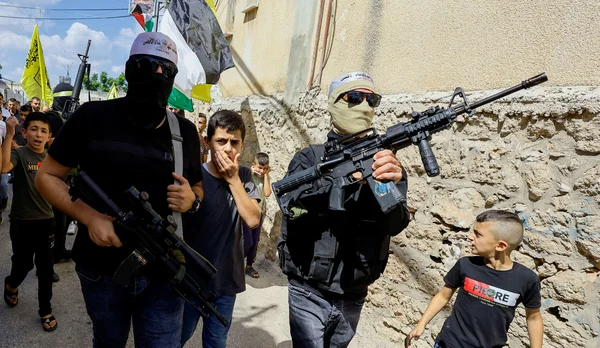Israeli raids on militant strongholds, especially in the Jenin area of the West Bank, have become a near-daily occurrence, especially since the Palestinian Authority’s security apparatus has all but given up on trying to maintain a semblance of order in the town.
But the raid on Wednesday morning, which was aimed at arresting or killing two men who were allegedly involved in a number of shooting attacks, looks like an escalation.
Unusually, Israeli forces entered Jenin in full daylight, and the scale of the operation and firepower used were irregular as well. Abed Fathi Hazem (whose brother murdered three Israelis in Tel Aviv five months ago) and Ahmed Nazmi Alawneh were both killed, and according to Palestinian sources, Israeli forces killed two more and wounded another 44. Furthermore, at least one of those killed is a member of Palestinian security forces. Fatah, the movement which dominates the Palestinian Authority has called for a “Day of Rage,” and marches on Israeli checkpoints.
In contrast, much of what Israeli and Palestinian leaders are saying nowadays seems to be happening on a virtual level. Prime Minister Yair Lapid emphasized his support for the two-state solution in his UN speech, and Palestinian President Mahmoud Abbas called this “a positive development,” while asking the UN to award Palestine full state-status and deliver a plan for an end to the occupation. He then phoned President Isaac Herzog and Defense Minister Benny Gantz (though interestingly not Lapid) to wish them a happy new year for Rosh Hashanah.
All this goes on as if there were actual negotiations and the PA was a state-in-the-making. But in the real world, it has already lost control of Jenin, the main town in northern Samaria, and is in risk of losing Nablus, the West Bank’s largest commercial center as well.
More and more, Fatah and local security forces’ chieftains are choosing to deflect blame over their own corruption and loss of control at Israel, and an increasing number of their members are involved in shooting incidents. This is a very similar dynamic to that of the early days of the Second Intifada in September 2000. It’s still much too early to predict a similar widespread outbreak of violence in September 2022, but it’s becoming difficult for Israeli politicians to dismiss events in the West Bank.
With 34 days to go to the election, the Palestinian issue is threatening to dominate the campaign. This hasn’t happened in years. In fact, it’s hard to recall an election in over a decade (there were quite a few) when the Palestinians were on the agenda, but if the violence in the West Bank spreads into the Green Line, as it did in April, it will be.
If past experience is anything to go by, that means bad news for the current government. Israeli voters don’t like it when their leaders fail to keep the occupation out of sight and mind.




Leave a Reply
You must be logged in to post a comment.